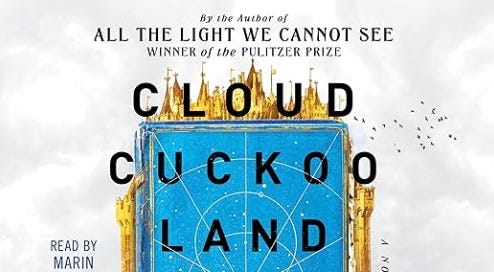BookLife Review by Carol O’Day: Cloud Cuckoo Land (Anthony Doerr, author)
Pulitzer prize winning author, three stories in one-historical fiction, contemporary fiction, futuristic fantasy, power of story, libraries, returning home, gay character, autism spectrum disorder
Cloud Cuckoo Land is Pulitzer Prize-winning author Anthony Doerr’s latest novel (All the Light We Cannot See, Pulitzer 2015). It is a wildly ambitious and challenging literary fiction novel. It simultaneously inhabits three genres; it is a work of historical fiction, a contemporary fiction novel and a futuristic fantasy. Doerr tells three stories, involving five principal characters, in three different periods of time–ancient Constantinople (Istanbul), modern day Idaho and a future ostensibly in deep space after destruction of planet Earth by climate change and environmental disaster. The three disparate stories are brilliantly tied together by one magical, fantastical story that touches all three eras.
The ancient world story gives us Omeir and Anna, who do not come together until almost the end of the novel. Omeir is a young boy with a cleft palate who is believed by the locals to be a cursed demon-child, and his birth compels his family to retreat to the hills. When he is a young teen, Omeir is drafted by the sultan for his conquest of Constantinople. Anna is an orphaned girl indentured as a servant in a wealthy home to embroider priests’ vestments along with her sister, Maria. Unlike her sister, Anna has no talent for embroidery and absconds from the workroom daily in search of books and lessons from a Greek tutor. She learns until she can decipher ancient texts. She happens upon pages from a book by Diogenes that tell the story of Aethon, a shepherd who longs to become a bird and fly to paradise in the clouds.
The modern day story within the novel is shared by the characters Seymour and Zeno. Seymour is the son of an impoverished single mother and he lives with autism spectrum disorder which manifests in him as extreme sensitivity to sound and a fierce fascination with and loyalty to nature, owls in particular. He is a regular visitor of the local library but is alienated from peers and limited by his mother’s poverty. He is radicalized online to a group of environmental terrorists and determines that bombing the local real estate developer by planting a bomb in the library next door will be his salvation and ticket into the radical group. Zeno is in his eighties when Seymour is planning his crime, rehearsing a play with a group of fifth grade children at the library. Zeno wrote a play for the children to perform after translating the ancient text of Diogenes’ story about Aethon. In flashback, Doerr takes us back to Zeno’s lonely childhood, as the only son of a single father who died at war, after which he was raised by an eccentric old woman in town. Zeno enlists in the Korean War, and is taken prisoner of war. In the prison camp he meets and falls in love with a fellow soldier who teaches him how to translate Greek during their captivity.
Konstance lives aboard a spaceship in the mid-twenty first century. The ship is inhabited by a small cohort of Earth’s climate refugee families. The spaceship is bound for a planet which they hope to repopulate. However, the target planet is located in deep space. None of the travelers currently on board will live to land there; they are only players in the journey to bring their descendants forward. Konstance is enamoured with history and stories her father tells her. She discovers that her father’s tales hail from the ancient story of Aethon and his fantastical journey to paradise. Through advanced technology, in the spaceship’s library, Konstance can summon any book in history ever written, and travel through virtual reality to the Earth as mapped at the time of the ship’s departure. She encounters a mystery when she is sequestered due to a viral outbreak onboard and she is unable to locate Aethon’s ancient book within the ship’s database.
Not only do the three time periods each rely upon the magic of Diogenes’ story of Aethon, but each character embarks in unique ways on a journey and a yearning to return to his or her return to a physical or spiritual home. Omeir longs to leave the military and return to his mountain community. Anna flees captivity and her besieged city, encounters Omeir outside its walls and travels with him to make a home in the mountains. Seymour longs to belong in a place where nature is sacred and he is not an outsider. Zeno journeys to war and back and revels in the solace of home in his work as a translator and in the stacks of the library. Konstance endures much of her journey alone in lockdown with only a computer as a companion, but she forges her way back through history to her future home.
Though almost unfathomable, Doerr methodically weaves the connection between these three stories across centuries and millennia. The power of stories and libraries to soothe and uplift, to inform and educate, and to unite us, underpins all three tiers of Doerr’s novel. By the conclusion of the novel, Doerr connects what initially appears to be three disparate stories into a single unified whole. The connections across multiple generations unfold elegantly and delight the reader as they deftly fall into place. Each of the characters experiences both the power of a story or a book to uplift and comfort, and the undying drive to return home. Cloud Cuckoo Land is a challenging read. In the hands of Anthony Doerr, it is a challenge that lovers of ambitious literary fiction will embrace.
Please support BookLife: Reviews for Readers and independent book sellers by purchasing Cloud Cuckoo Land using the Bookshop.org link below.





